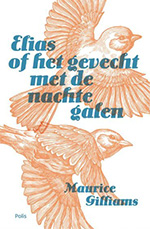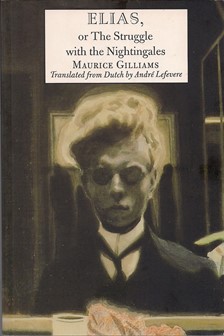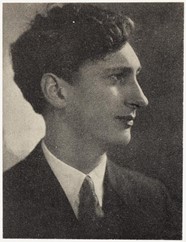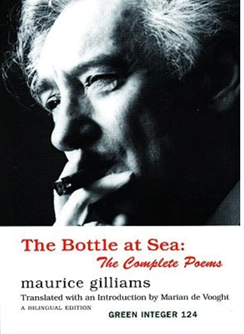It’s a great pity altogether...
The devoted readership of Maurice Gilliams’ out-of-print Elias or The Struggle with the Nightingales
“When Aloysius disturbs our hearts, we hang upside down in reality like enchanted apes. He is sixteen and a full four years older than I am. In bed at night we fold paper boats and let them float down the brook outside the estate the next day, Aloysius sits hidden under the covers, busy, with a pencil I presume. Without showing himself to me he hands me the pages from the notebook, one by one, and I put the same folds in them, always.”

These are the English opening lines of the so-called first cahier of Elias or The Struggle with the Nightingales by the Antwerp writer Maurice Gilliams (1900-1982). Although also the author of sixty-something poems – some of them firmly written into the collective memory of Dutch language poetry – Gilliams is probably best known for his very first novel: Elias of het gevecht met de nachtegalen (1936). This lyrical and haunting mix of childhood memoire and country house novel was published in Amsterdam by Meulenhoff and was hailed in the Netherlands and Flanders as a textbook example of modernist prose. To summarize its critical reception: with Elias, Flanders had brought forth an exquisite novel that could compete with literary works not only in the Netherlands but also in the rest of Europe. With such international recognition in mind, critics never failed to highlight that Gilliams’ writing showed great affinity with the prose of admired European authors such as Alain-Fournier, Rainer Maria Rilke and Marcel Proust.
Elias in English: Sun & Moon Press

Although critically acclaimed in the Low Countries, canonized as one of the most beautiful literary works in the Dutch language, and available in German (1964), French (1968), Romanian (1968) and Polish (1971), it was only in 1995 that Gilliams’ coming of age story appeared in an English edition. The text was translated by André Lefevere and published by the now demised American publisher Sun & Moon Press. Despite its high status in the literary history of the Low Countries, Elias or The Struggle with the Nightingales went rather unnoticed in the Anglophone world. Sun & Moon Press was a small and ‘alternative’ publishing venture, founded in 1976 by Douglas Messerli and focusing on rather experimental poetry, fiction and drama in translation. It probably did not have enough of a reputation to drum up propulsive and visible enthusiasm for this small Flemish novel. As far as I am aware, it did not manage to generate any significant reviews or secure shelf space at prestigious retailers. The fact that Sun & Moon (wrongly) categorized Elias as a ‘Children’s Classic’ undoubtedly did not help either.
Elias appeared as part of the Sun & Moon Classics series, initiated in 1986 and dedicated to the production of major texts in English and in translation. Apart from Maurice Gilliams’ debut novel, the series contained literary work by innovative writers such as Gertrude Stein, Djuna Barnes, Émile Zola, Paul Celan, Stijn Streuvels, the Norwegian novelist Tarjei Vesaas, and Austrian writers Arthur Schnitzler and Heimito von Doderer.

The Los Angeles-based publisher clearly had further plans with Gilliams. Reading the text on the back of the English edition of Elias, I notice that the book that I am holding had to pass for the first part of a ‘great trilogy’, which Sun & Moon Press would publish in ‘upcoming seasons’. The other two volumes of that trilogy that isn’t really a trilogy – Winter te Antwerpen (1953) and the posthumously published Gregoria of een huwelijk op Elseneur (1991) – never made it to the Sun & Moon printing presses. They remain untranslated into English to this day.
A quick search online uncovers that Elias or The Struggle with the Nightingales is listed as an out-of-print title. Buyers looking on Amazon are (inexplicably) re-directed to New Jack: Sing Sing, Ted Connover’s account of a rookie year as a guard at the infamous Sing Sing Prison. I also discover that it has become difficult to find a second-hand copy of the English edition of Gilliams’ ‘modern classic’. Years ago, I purchased as many as I could get my hands on for my students. I remember how the slim paperbacks arrived from various secondhand booksellers; the copies usually unread, their binding often still firm, their beautiful yet rather gloomy Spilliaert covers only slightly faded, the layers of acidic dust included.
A devoted online readership
Yet, to my astonishment, that same quick web search also shows that the English Elias holds a special niche appeal. I click the links that lead me to the virtual odd shelves of a passionate British, Irish, American and Canadian readership that harbours the same tender feelings for Gilliams’ first novel as I do. Just like me, they find themselves “somewhat puzzled by the lack of interest in this book”. They connect with each other on Internet fora and give tips on where to find remaining copies. (“There seem to be a few copies of the English edition available on Abebooks,” says a user who goes by the name Makifat. “New copies still available at Small Press Distribution!” adds someone called Clay Banes.) They award stars on individual book blogs and on large platforms such as Goodreads, where some hiccup in the algorithm has littered their Gilliams critiques with reviews of, again, Ted Connover’s prison book. I scroll and I agree:


Furthermore, these devoted readers do what Sun & Moon Press failed to do on the back cover of Elias: they rightly match Gilliams’ lyrical and slightly obscure account of a Flemish childhood with cult texts such as J.D. Sallinger’s The Catcher in the Rye (1951) or with the recently revived In Youth is Pleasure (1945) by Denton Welsh. It is exactly this ‘cultural matching’ that is so crucial in the branding of a foreign novel.

And finally, they eagerly await more revelations of Elias’ intriguingly divided nature. They lament the fact that the publisher did not keep its 1995 back cover promise. “It’s a great pity altogether”, writes one anonymous blog commentor in 2011, “that the translator, André Lefevere, died within a year of the publication of this book” and that none of Gilliams’ other prose has been translated into English. The commentor is, however, resolved to make some inquiries with Green Integer Books, which succeeded Sun & Moon Press in 2004 and published in 2006 The Bottle at Sea, a bilingual edition of Maurice Gilliams’ ‘complete poems’, translated by Marian de Vooght.
So, there is a loyal Gilliams following out there and their message is simple: bring us more of Maurice Gilliams in English translation! We can only hope that one day an English, American, Irish, Australian or Canadian publisher will consider their wish.
(Filip De Ceuster)
References
De Ceuster, Filip (2017). “Breng die Elias terug op onze wereld.” In: Maurice Gilliams & Filip De Ceuster, Elias of het gevecht met de nachtegalen. Antwerpen: Polis, pp. 175-223.
Gilliams, Maurice (1995). Elias or The Struggle with the Nightingales. Translated from Dutch by André Lefevere. Los Angeles (CA): Sun & Moon Press.
KANTL (2015). De canon. De 50+1 mooiste literaire werken uit de Nederlanden. Gent/Antwerpen: Koninklijke Academie voor Nederlandse Taal- en Letterkunde, pp. 274-277.
Makifat (2011). Bibliophilia Obscura. Elias, or the Struggle with the Nightingales by Maurice Gilliams. Online: makifat.blogspot.com/2011/07/elias-or-struggle-with-nightingales-by.html
Fotobijschriften
(1) Latest edition of Elias of het gevecht met de nachtegalen (Polis 2017). Cover design: Stijn Dams.
(2) Elias or The Struggle with the Nightingales (Sun & Moon Press 1995). Cover: Leon Spilliaert, Autoportrait (c. 1907-1908).
(3) Portrait of Maurice Gilliams. Collection Letterenhuis Antwerpen.
(4) The Bottle at Sea. The Complete Poems (Green Integer Books 2006)
